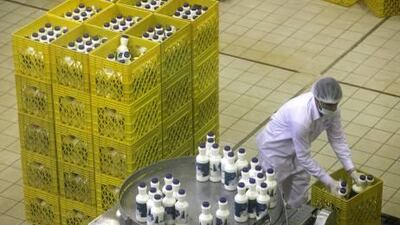DUBAI // The emirate's Food Control Department and Central Laboratory has had its hands full monitoring dairy products during one of the hottest holy months on record.
Its testing programme runs throughout the year, but intensifies during Ramadan, when demand for the products rises, and during summer, when the hot weather can complicate safe storage methods.
Samples of milk and laban, both on the shelves and on the way to the markets, are among the products it tests for harmful bacteria, with inspectors checking products brought through air, land and sea ports.
"The microbiological tests include checking for the presence of bacteria, such as the Escherichia coli and coliform, and testing for the presence of other microorganisms such as yeasts and fungi," said Khalid Mohammed Sharif, the director of the Food Control Department.
"Dairy products in the summer and Ramadan should be examined intensively as consumption multiplies during this season."
If the laboratory finds contamination, regulators order the withdrawal of the product from local markets.
Chain supermarkets such as Spinney's said management kept a close watch on deliveries and took measures to prevent spoilage.
"We follow the temperature brackets for all dairy products, which vary for milk, juice and ice cream for example," said a Spinney's representative. "When the products arrive, we check the temperature before accepting anything. If the temperature is wrong, then we reject the item."
Dairy products are high-risk foods, Mr Sharif said. If they are not properly refrigerated, harmful bacteria can grow.
"Dairy items such as milk and cream are pasteurised, and once such a heat treatment is given, they are chilled and distributed. During summer months, it is difficult to maintain the cold chain because of the high temperature outside," Mr Sharif said.
Demand for dairy and fermented products during Ramadan and Eid rises by 30 to 40 per cent, and juice by 10 to 15 per cent, according to Mohammed Hassan, a quality assurance and product development manager for Al Rawabi Dairy.
Random samples taken by the municipality from the products shipped to supermarkets keep the industry on its toes to ensure consumer safety, he said.
"Our advice to our consumers during the summer months is, please treat these products as perishable and take the utmost care during handling," Mr Hassan said. "Always purchase dairy products at the end of shopping. Once home, immediately transfer to the refrigerator and use the products within recommended shelf life periods."
At another dairy farm in Al Khawaneej, Dubai, resident veterinary doctors keep the cattle healthy and a vaccination programme ensures a disease-free herd.
In addition, a high-quality air conditioning system protects the animals and their milk from the summer heat.
"We are passionate about maintaining the high quality and freshness of our milk," said Dr Ahmed Rahim, the general manager of Al Rawabi Dairy Company. "Al Rawabi is perhaps the only dairy company in the region with its farm adjacent to its processing plant, so it takes only minutes to move the milk from the farm to the plant for pasteurisation.
"Other milk producers transport milk over long distances from farms to their plants and hence there is a significant chance of higher bacteria count."

